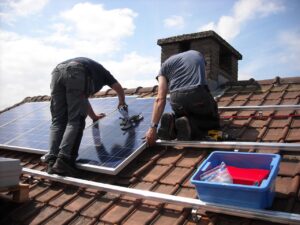No, solar panels do not work at night.
Solar panels generate electricity by harnessing sunlight and converting it into electrical energy through a process called photovoltaics. They cannot produce electricity when there is no sunlight, such as at night or on very cloudy days.
Here’s everything you need to know about why solar panels don’t work at night.
Why Solar Panels Don’t Work At Night
Solar panels consist of multiple solar cells, each composed of two thin layers of semiconductor material, typically silicon. Silicon, on its own, is not an efficient conductor, so these wafers undergo a process called “doping” with impurities to enhance their conductivity.
One of these wafers is doped with phosphorus to introduce additional free electrons, giving the wafer a negative charge. Conversely, the other wafer is infused with boron, which creates more receptor sites for electrons, resulting in a positive charge. This setup generates an electrical field within the solar cells, which allows free electrons to move within it.
This is where the role of sunlight becomes crucial.
Sunlight consists of photons- tiny packets of energy. When a photon strikes a solar cell, it dislodges an electron, creating an electron vacancy, or “hole.” The electron naturally seeks to fill this vacancy, but the electric field guides the vacancy towards the positive side and the free electron towards the negative side of the cell.
The electron must follow a longer path to return to its original position. These electrons in motion constitute the current in your photovoltaic (PV) system, while the electric field creates the voltage. The current generated by these cells flows out of each panel, passes through inverters, and eventually powers your home.
Without the energy from the sun to initiate the dislodging of electrons from their equilibrium, there would be no flow of electrons, hence no current, and consequently, no power supplied to your home.
How Solar Panels Work At Night

Solar panels do not generate electricity at night, but there are two primary methods for making solar power available around the clock.
Net Metering (NEM)
This common approach involves producing surplus solar energy during the day, which is fed back into the utility grid. Homeowners receive credits for this excess generation, which offset the electricity they consume from the grid at night and during periods of low solar production.
The balance of credits and debits is reconciled annually. Many solar systems aim for 100% offset, effectively reducing monthly utility bills to $0.
Battery Storage
The second method involves using batteries to store excess solar energy. This stored energy can be used independently of the grid or only accessed infrequently. By combining solar panels with battery storage, homeowners create their own self-sustaining energy source, achieving energy independence.
Solar and battery systems also serve as reliable backup power sources during emergencies, such as heatwaves and hurricanes.
Additionally, on a commercial scale, some utility-scale solar operations employ thermal banking, using molten salt to store heat energy during the day and then releasing it at night. This enables power generation from stored heat, even during the early hours of the night.